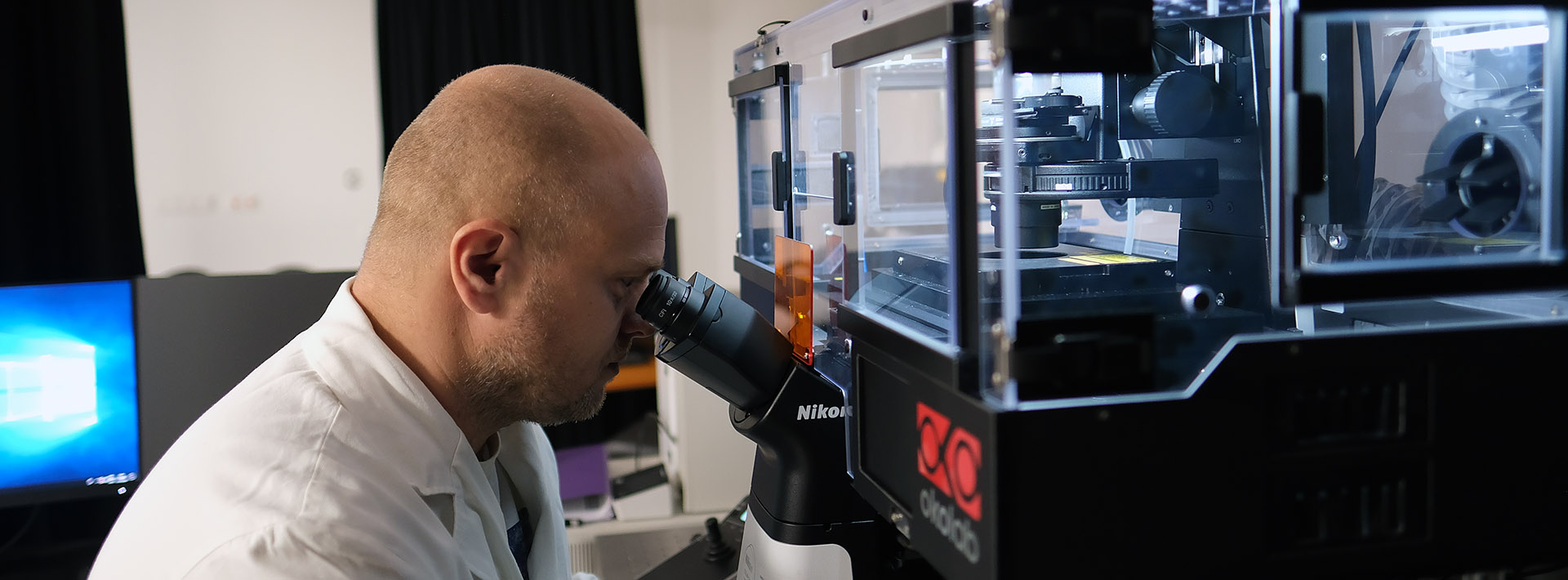Adatok
A Tantárgybejelentőben megadott hivatalos adatok az alábbi tanévre: 2024-2025
Tantárgyfelelős
-
Zelena Dóra Tímea
professor,
Institute of Physiology
Óraszámok/félév
előadás: 0 óra
gyakorlat: 28 óra
szeminárium: 0 óra
összesen: 28 óra
Tárgyadatok
- Kód: OBA-125-G
- 2 kredit
- Biotechnology MSc
- Basic modul
- autumn
OBA-110-E parallel
Kurzus létszámkorlát
min. 5 fő – max. 24 fő
Tematika
The goal of the course is to disclose human physiological processes to the students. By means of the knowledge of complex human physiological processes the biotechnology students will also learn the interconnections and mutual influences of physiological systems and they will utilize their knowledge in planning and executing related animal model experiments and pharmaceutical tests.
Előadások
Gyakorlatok
- 1. Blood. Red blood cell and differential leukocyte count, blood groups.
- 2. Blood. Red blood cell and differential leukocyte count, blood groups.
- 3. Heart. Examinations on the in situ and isolated heart. Stannius ligatures. Cardiac cycle. Extrasystole.
- 4. Heart. Examinations on the in situ and isolated heart. Stannius ligatures. Cardiac cycle. Extrasystole.
- 5. Electrocardiography and phonocardiography.
- 6. Electrocardiography and phonocardiography.
- 7. Circulation. Arterial blood pressure and pulse. Microcirculation. Effects of adrenaline and acetylcholine.
- 8. Circulation. Arterial blood pressure and pulse. Microcirculation. Effects of adrenaline and acetylcholine.
- 9. Respiration Spirometry: lung volumes, capacities and dynamic parameters. Compliance.
- 10. Respiration Spirometry: lung volumes, capacities and dynamic parameters. Compliance.
- 11. Measurement of metabolic rate. Basal and actual metabolic rate.
- 12. Measurement of metabolic rate. Basal and actual metabolic rate.
- 13. Reproductive physiology: Estrous cycle, menstrual cycle. Pregnancy tests.
- 14. Reproductive physiology: Estrous cycle, menstrual cycle. Pregnancy tests.
- 15. Carbohydrate metabolism: detection of blood glucose, glucose tolerance test, diabetes mellitus.
- 16. Carbohydrate metabolism: detection of blood glucose, glucose tolerance test, diabetes mellitus.
- 17. Electrical stimulation of peripheral nerve. Electrotonic potentials, action potentials. Cathode make and anode break excitations.
- 18. Electrical stimulation of peripheral nerve. Electrotonic potentials, action potentials. Cathode make and anode break excitations.
- 19. Compound and single fiber action potential, conduction velocity, chronaxy and rheobase.
- 20. Compound and single fiber action potential, conduction velocity, chronaxy and rheobase.
- 21. Muscle physiology: Summation, superposition, incomplete and complete tetanus. Fatigue. Electromyography.
- 22. Muscle physiology: Summation, superposition, incomplete and complete tetanus. Fatigue. Electromyography.
- 23. Central nervous system physiology I.: Reflexes. Stereotaxic technique.
- 24. Central nervous system physiology I.: Reflexes. Stereotaxic technique.
- 25. Central nervous system physiology II.: Sensory systems.
- 26. Central nervous system physiology II.: Sensory systems.
- 27. Central nervous system physiology III.: Electroencephalography, evoked potential, sleep.
- 28. Oral report.
Szemináriumok
A tananyag elsajátításához szükséges segédanyagok
Kötelező irodalom
John E. Hall & Michael E. Hall: Guyton and Hall Textbook of Medical Physiology (Elsevier), 14th Edition, 2020, ISBN: 0323597122 (Elsevier)
Saját oktatási anyag
Figures of the lectures given are available on the homepage of Institute of Physiology and on the Neptun Meet Street.
Important messages on new information will be announced at the lectures and will be sent to you by course mails.
Please always find the current updated information and study materials on the homepage of the Institute of Physiology (physiology.aok.pte.hu).
Jegyzet
Find and read the relevant chapters in:
Homepage of PTE ÁOK Institute of Physiology: Physiology Lab Practices, internet study material, printable notebook, 2024
Homepage of PTE ÁOK Institute of Physiology: Physiology Lab Practice Worksheets, internet study material, printable notebook, 2024
Ajánlott irodalom
Thomas M. Jessell Steven A. Siegelbaum: Principles of Neural Science, Sixth Edition, 2021, ISBN 1259642232 (McGraw-Hill)
Pocket Companion to Guyton and Hall Textbook of Medical Physiology (Guyton Physiology) 14th Edition by John E. Hall PhD, Michael E. Hall MD MSc. (2020)
A félév elfogadásának feltételei
Regular oral reports at the lab practices.
Félévközi ellenőrzések
Regular oral reports at the lab practices.
Távolmaradás pótlásának lehetőségei
The missed lab practice is advised to be covered by joining another group while the same topic is on schedule.
Vizsgakérdések
Questions for the lab practice report:
1. Blood. Red blood cell and differential leukocyte count, blood groups, osmotic resistance of red blood cells.
2. Heart. Examinations on the in situ and isolated heart. Stannius ligatures. Cardiac cycle. Extrasystole.
3. Electrocardiography and phonocardiography.
4. Circulation. Arterial blood pressure and pulse. Microcirculation. Effects of adrenaline and acetylcholine.
5. Respiration. Spirometry: lung volumes, capacities and dynamic parameters. Compliance.
6. Measurement of metabolic rate. Basal and actual metabolic rate.
7. Reproductive physiology: Estrous cycle, menstrual cycle. Pregnancy tests.
8. Carbohydrate metabolism: detection of blood glucose, glucose tolerance test, diabetes mellitus.
9. Electrical stimulation of peripheral nerve. Electrotonic potentials, action potentials. Cathode make and anode break excitations.
10. Compound and single fiber action potential, conduction velocity, chronaxy and rheobase.
11. Muscle physiology: Summation, superposition, incomplete and complete tetanus. Fatigue. Electromyography.
12. Central nervous system physiology I.: Reflexes. Sensory systems.
13. Central nervous system physiology II.: Electroencephalography, Stereotaxic technique.
Study material for the exam is the sum total of information covered in the obligatory textbook, on the homepage of the Institute, as well as knowledge given at the lectures and lab practices.
Vizsgáztatók
- Kertes Erika
- Kóbor Péter
- László Bettina Réka (Csetényi)
- Lengyel Ferenc
- Péczely László Zoltán
- Péliné Kovács Anita
Gyakorlatok, szemináriumok oktatói
- KURZUSHOZ RENDELT OKTATÓ
- Zagorácz Olga
